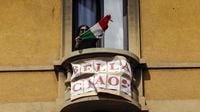In Romano di Lombardia, a small town in the province of Bergamo, a significant controversy has erupted in the lead-up to the April 25th celebrations, which commemorate Italy's liberation from fascism. The local administration, led by Paolo Patelli, president of the city council and a member of the Lega party, has issued a ban on singing the iconic partisan song "Bella ciao" during the parade. This decision has sparked outrage among members of the local Anpi (National Association of Italian Partisans), who argue that such restrictions undermine the very essence of the celebrations.
The controversy began when Patelli released a note urging citizens to observe a period of sobriety and respect due to the national mourning for the death of Pope Francis. The note specified that no musical pieces, hymns, or songs would be permitted during the first stages of the parade, with the exception of the "Silenzio" and "Attenti". This directive was seen as an overreach by many, particularly the Anpi, which has historically championed the values of freedom and democracy that April 25th represents.
Walter Torioni, the president of the local Anpi, expressed his profound disappointment and dismay at the decision. "I see these measures as an attempt to silence the celebration of April 25th, diminishing its significance as a popular festival commemorating the liberation and exercise of democracy, which should not be impeded by mourning for a pope who was close to the values of the Resistance," he stated. Torioni emphasized the song's historical importance, arguing that while the band may be prevented from playing "Bella ciao", citizens should still have the right to sing it freely.
In response to the backlash, Patelli defended the ban, labeling the criticism as a "pretextual attack". He clarified that the prohibition on musical accompaniment applies solely to the first four stages of the corteo, and that the schedule for the event will remain unchanged for the stop at the monument to the Fallen and the conclusion in piazza Roma. This clarification has done little to quell the anger among proponents of the Anpi, who view the restrictions as an affront to their rights and the spirit of the celebration.
The April 25th celebrations in Italy are a deeply significant occasion, marking the end of Nazi occupation and the fall of fascism in 1945. "Bella ciao", originally sung by partisans during World War II, has become a symbol of resistance against oppression and is often associated with struggles for freedom and democracy. Its prohibition in Romano di Lombardia has brought to light broader discussions about the role of historical memory in contemporary society and the potential for political motives to influence cultural expressions.
As the date approaches, tensions remain high. Local residents and members of the Anpi are planning to gather and sing "Bella ciao" regardless of the official ban, asserting their right to celebrate their history and heritage. The situation has attracted media attention, with various outlets reporting on the unfolding drama. The Corriere della Sera, among others, has highlighted the divisive nature of the ban and its implications for public expressions of identity and remembrance.
Critics of the ban argue that it reflects a troubling trend in Italian politics, where the values of democracy and freedom are sometimes overshadowed by political agendas. The Anpi, which has long been a voice for preserving the memory of the Resistance, sees the current situation as emblematic of a larger struggle against attempts to rewrite or diminish Italy's history.
The upcoming celebrations are expected to draw significant participation, with many citizens eager to assert their rights to express their historical narratives. As the local Anpi prepares for the event, they are calling on supporters to join them in a peaceful demonstration of solidarity and remembrance.
This year's April 25th events in Romano di Lombardia may serve as a flashpoint for broader discussions about national identity, historical memory, and the ongoing relevance of songs like "Bella ciao" in the context of contemporary Italy. The outcome of this controversy could have lasting implications for how public commemorations are conducted in the future, particularly in the face of political pressures.
Ultimately, the events in Romano di Lombardia are a reminder of the power of music and collective memory in shaping cultural identity. As citizens prepare to march on April 25th, the question remains: will the spirit of liberation and resistance prevail, or will political restrictions stifle the voices of those who wish to celebrate their history?






